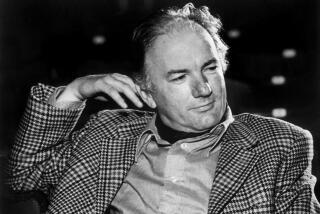Stanley Burnshaw, 99; Editor, Publisher of Works by Robert Frost
- Share via
Stanley Burnshaw, a respected man of letters who wrote poetry, books and critical reviews; edited, published and translated literary works; and befriended such legendary poets as Robert Frost, has died. He was 99.
Burnshaw died Friday on Martha’s Vineyard, Mass., of unspecified causes.
Sometimes seen as a defender or apologist for Frost, Burnshaw was well-known for editing and publishing the poet’s works as well as writing “Robert Frost Himself,” a biography published in 1986.
The book did much to offset an earlier three-volume account by Frost’s associate Lawrance Thompson, which portrayed the former U.S. poet laureate as vicious to his family and friends.
“Burnshaw shows us that Thompson not only often got his facts wrong, but insisted on seeing Frost’s actions again and again in the worst possible light,” wrote Paul Mariani in a book review for the Washington Post nearly two decades ago. “Burnshaw patiently marshals the evidence of other eyewitnesses who saw Frost in a kinder if no less complex light ... [and] has largely succeeded in setting the record straight.”
Burnshaw was also appreciated for his own eclectic writing -- including poetry, novels, nonfiction works, plays and reviews -- over more than seven decades. He published his first poems in 1927 in “The American Caravan: A Yearbook of American Literature.” His final book, an anthology of poetry, was published in 2002.
His first book was “Andre Spire and His Poetry,” an analysis of Spire’s free verse, in 1933.
“The Seamless Web” published in 1970 about the creation and comprehension of poetry was perhaps Burnshaw’s best-known book.
“He has made a more ferocious and sustained effort to define the nature of criticism than almost any of his confreres in the Great Game,” noted the British writer and London Observer critic Philip Toynbee. “What is ... important is that a major argument emerges which has never quite emerged in any previous work or body of work.”
Burnshaw educated readers at the same time that he inspired them. His books “The Poem Itself” (1960) and “The Modern Hebrew Poem Itself” (1965) were breakthroughs in ways to view poems written in another language.
Each book contained the poem in its original language -- French, German, Spanish, Portuguese, Italian, Hebrew -- along with a line-by-line translation and an analysis. Toynbee called the whole enterprise “heroic, not only in its courage and considerable achievement, but also in a certain dogged, even naive, refusal to admit defeat.”
Robert Hass, who used Burnshaw’s translations in his own 1999 poetry analysis for the Washington Post, called the 1965 work one of his favorite books and praised Burnshaw for pointing out “odd things about the flavor of the language.”
Burnshaw’s translations of poetry have been reprinted in the Los Angeles Times Book Review as recently as 2002.
Born June 20, 1906, in New York City, the son of Eastern European immigrants, Burnshaw attended Columbia University before graduating from the University of Pittsburgh in 1925. He began his literary career by publishing Poetry Folio, a small magazine for which he set the type by hand.
He worked as an advertising copywriter for a steel mill for two years, then went to France and studied at the Universities of Poitiers and Paris. Returning to New York in 1928, he worked as an advertising manager before attending Cornell University, where he earned a master’s degree in 1933.
Unable to find a teaching job in the midst of the Depression, he became an editor and drama critic for New Masses, a weekly Communist magazine.
It was there that he launched a literary feud with poet Wallace Stevens. Reviewing Stevens’ 1935 “Ideas of Order” about the Depression’s breakdown of society, Burnshaw called the poet “a man who, having lost his footing, now scrambles to stand up and keep his balance.”
Stevens, furious, countered by writing a poem he called “Mr. Burnshaw and the Statue.”
Although Burnshaw never was a member of the Communist Party, he wrote a book of leftist poetry and a verse play examining greed’s effect on technology. But he rejected Marxism later, as illustrated by his 1945 book “The Revolt of the Cats in Paradise.”
Burnshaw joined the publishing firm Corydon House in 1937, and two years later established his own publishing company, Dryden Press. After it was acquired by Holt, Rinehart & Winston in 1958, Burnshaw stayed on as a vice president and an editor for another decade.
Burnshaw is survived by his wife, Susan Copen Oken; his daughter from a previous marriage, Valerie Razavi of Manhattan; and one grandchild.
More to Read
Sign up for our Book Club newsletter
Get the latest news, events and more from the Los Angeles Times Book Club, and help us get L.A. reading and talking.
You may occasionally receive promotional content from the Los Angeles Times.








